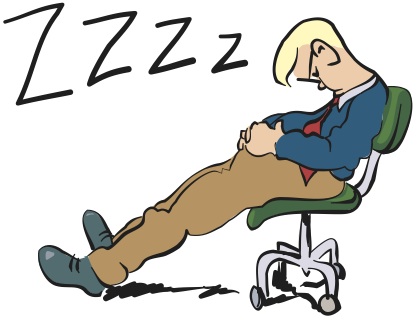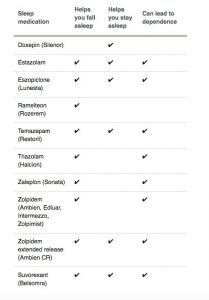
ADHD Sleep Medication
Trouble sleeping? You’re not alone; according to the American Sleep Association 50-70 million American adults have a sleep disorder. Before trying any sleep medications we suggest speaking with your doctor first as well as trying the best practices for sleep hygiene first (see tips below). If you’ve tried those and you are ready to try a sleep medication here are some of the available options.
Sleep Disorder Medications
Do you have trouble falling asleep or do you have trouble staying asleep? Make sure you know the answer to this before seeking out sleep medication. The following chart from The Mayo Clinic explains the difference between various prescription medications.

Melatonin – Melatonin occurs naturally in the body but Melatonin as a medicine is synthetic and made in a laboratory. The body produces more Melatonin when it is dark and that tells the body to ‘Go to sleep!’ People who have trouble sleeping often have low levels of Melatonin and adding a Melatonin supplement may help them to sleep.
Clonidine – Primarily used to treat high blood pressure Clonidine is also used to treat the hyperactivity component of ADHD. This medication is not approved by the FDA to treat insomnia, but one of the side effects of this medicine is sleepiness. Clonidine has been studied as a sleep medication for children but not for adults.
Trazodone – This antidepressant medication is used to treat major depressive disorder. It may help to improve your mood, appetite, and energy level as well as decrease anxiety and insomnia related to depression.
Before trying sleep medication we suggest consulting with your doctor as well as following good sleep hygiene practices.
Good Sleep Hygiene
Good sleep hygiene refers to the habits you keep when getting ready to go to bed. Many adults have trouble shutting down their brain in order to fall asleep and for adults with ADHD this can be an even bigger challenge.
Tips For Getting a Better Sleep
Follow these steps in order to sleep better.
- Remove electronic devices from the bedroom, if it has a screen, makes a noise, or has the potential to make a noise (hello cellphone) place it in another room in your house.
- Make sure you wake up at the same time every day and go to bed at the same time every night. Consistency is a key factor in getting a good nights sleep. As Dr. David Pomeroy says “Do you have trouble falling asleep or do you have trouble getting to bed?”
- Keep your bedroom quiet and dark, make sure the temperature is set near 65 degrees Fahrenheit (18.3 Celsius) as a cool room will help most people stay asleep through the night.
- Stay active through the day, taking on exercise or keeping physically active may help you sleep better through the night.
- Avoid alcohol and caffeine in the late evening. Alcohol can reduce REM sleep and cause disturbances in your sleep.
- Your bed is comfortable and you may feel drawn to read, watch TV, chat or text on your phone, but keep the bedroom as a special place for sleep and sex as this will help your brain associate your bed with sleep.
Videos About Sleep
In this video “Why Can’t I Fall Asleep” Dr. David Pomeroy who has treated over 2,500 folks with ADHD, explains what we are doing, and you may be doing right now, that is making it harder for you to do what your ADHD mind is already struggling to do, namely shut itself down and fall asleep.
We’re up all day and it’s go go go! Then all of a sudden we try to lie down and get some sleep and our brain goes “what?!?! this is boring!” and does everything it can to keep us awake. In “Sleep Strategies for ADHD” coach Sarah Wright discusses some simple strategies to help you sleep.
Looking for more? Our video “ADDeep Sleep” explains even more ways to get a great night’s sleep, ADDeep Sleep is available in our online store
